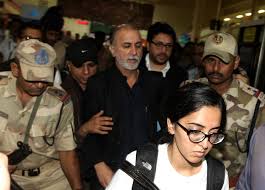Panaji, Nov 30: Tehelka editor-in-chief Tarun Tejpal is escorted on his arrival in Panaji, Goa on Friday. Tejpal is accused of sexually assaulting a woman journalist.
Tehelka editor-in-chief Tarun Tejpal, accused of sexually assaulting a junior colleague, was arrested here Saturday after a court rejected his anticipatory bail application.
Tejpal, who was at the Crime Branch office since 4.30 p.m., was taken into custody soon after the verdict was announced.
The much-delayed order on Tejpal's bail plead was pronounced just a shade past 8 p.m. by North Goa District and Sessions judge Anuja Prabhudessai.
The order, which allows Tejpal to avail of home food, bedding and clothing during his time in police custody, came nearly three and a half hours after 4.30 p.m., the time by which Prabhudessai was initially scheduled to make the announcement.
Sources said that the delay was caused because of the time taken by the judge to dictate the order to her steno.
Accused by police of dodging them over the last few days, Tejpal's presence in the Crime Branch office was seen an attempt to avoid being paraded in public from the courtroom to custody, located more than five kms away.
His wife Geetan, sister Neena, daughters Tiya and Cara and friends were seen waiting outside the Crime Branch office until late in the night.
As Tejpal and his family left the court premises on his way to a city hotel after noon, a yet unidentified person shouting slogans against the editor, charged towards him with a black cloth, but was overpowered and whisked away by police.
Earlier in the day, lawyers from the defence as well as the prosecution matched their wits against each other over the issue of anticipatory bail to Tejpal. He had been granted anticipatory bail Friday, a couple of hours before he surfaced at New Delhi's IGI airport and boarded a flight for Goa.
While the defence was granted four hours to make their case, the prosecution bench took only 45 minutes to make their case and eventually win the first battle.
The defence extended its argument made on Friday that Tejpal was fully co-operating with the investigators and that custodial interrogation was not necessary.
Lead defence lawyer Geeta Luthra offered several concessions to the prosecution like Tejpal's willingness to stay in Goa until police requires, surrendering of his passport and fixed deposits among others.
"I have offered that I will stay in Goa until a chargesheet is filed. I can be in Bangalore. I can be wherever this court directs," Luthra also said on Tejpal's behalf.
She also assured that for the duration of the investigation, Tejpal would not visit Mumbai, where the victim resides.
She said that Tejpal does not have any criminal record and therefore should be considered or anticipatory bail.
Specially appointed public prosecutor Saresh Lotlikar, however argued that Tejpal was changing colours like a chameleon and that police custody is required to complete the Tejpal end of the probe and get the real story out of him.
"Custodial interrogation is a must," Lotlikar said.
"Your contention that your (Tejpal's) immaculate reputation will be damaged... may we tell you that it's already gone for a toss, and mere detention under police custody won't do any further damage," the prosecution argued.
Lotlikar also submitted the victim's statement to the judge and said that CCTV footage secured by police from the hotel had "enough hints" to confirm the victim's allegations of rape.
The prosecution also refuted claims made by the defence that the complainant had "vested interests" and therefore delayed informing her superiors about the two alleged sexual assaults by Tejpal in a Goa resort earlier this month.
"The lady is known to accused and her father was a friend of the accused. Being the sole breadwinner, she had to make the decision of her life before writing the email," Lotlikar argued, saying that the victim had confessed about the assault in the elevator to two-three colleagues.
Lotlikar also said that Tejpal's associates had even tried to intimidate the victim's kin in Delhi and that a case had already been filed in that regard.
"That the accused is trying to interfere with investigation is proved in the case," Lotlikar said, making a strong case for Tejpal's custodial interrogation.
Lotlikar also accused Tejpal of insulting the victim by questioning her integrity adding that she had been "violated by a person who was like a father figure".





Comments
Add new comment